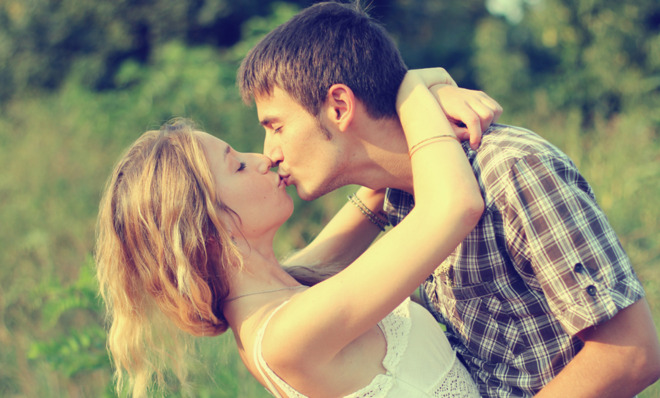Why do we kiss? Behavioral science weighs in.
A kiss is just a kiss — unless you're looking for a healthy committed relationship

A free daily email with the biggest news stories of the day – and the best features from TheWeek.com
You are now subscribed
Your newsletter sign-up was successful
Kissing is fun. Most of us think so, at least. The fact that we're deliberately choosing to swap saliva, germs, and whatever may be left over from our romantic partner's fettuccine alfredo is one of those uniquely human pastimes that's gross in premise, but wonderful in practice — most of the time, anyway.
Kissing is a universally recognized part of the gladiator pit single people like to call dating, and an essential part of the courtship ritual. For evidence: Only 10 percent of cultures around the world don't kiss. And some primates, likes chimps and bonobos, are known to lock lips as well, although with a bit less finesse than their hairless human relatives.
Behavioral scientists have floated all kinds of theories for why humans regularly indulge in the awkward act of locking mouths. One of the more prevalent theories suggests kissing helps us assess the long-term genetic potential of future mates and allows us to sniff their pheromones. More obviously: Kissing also helps with arousal, which helps ensure the enduring survival of the human race. And it may even help those in deeply committed relationships stay together in the long run.
The Week
Escape your echo chamber. Get the facts behind the news, plus analysis from multiple perspectives.

Sign up for The Week's Free Newsletters
From our morning news briefing to a weekly Good News Newsletter, get the best of The Week delivered directly to your inbox.
From our morning news briefing to a weekly Good News Newsletter, get the best of The Week delivered directly to your inbox.
That last bit may be the most important revelation from a new study from the University of Oxford, which has a bit more canonical evidence for why we kiss each other. "Mate choice and courtship in humans is complex," said Robin Dunbar, a neuroscience researcher and co-author of the study. "It involves a series of periods of assessments where people ask themselves 'shall I carry on deeper into this relationship?'"
For this study, published in two parts in the journal Archives of Sexual Behavior and in the journal Human Nature, the team set up an online questionnaire and queried 900 adults about the importance of kissing in both short-term and long-term relationships. The answers, primarily from the U.S. and the U.K., provided some some key insights.
"Men are more likely to initiate kissing before sex, when it might be used for arousal purposes," the authors wrote, "whereas women are more likely to initiate kissing after sex, where it might better serve a relationship maintenance function."
In short-term relationships, participants noted that kissing was more important "before sex, less so during sex, [and] was less important again after sex."
A free daily email with the biggest news stories of the day – and the best features from TheWeek.com
But perhaps the biggest and most useful takeaway from the survey was this: That lots of kissing was associated with a satisfying and ultimately healthy long-term relationship. Oddly enough, the same couldn't be said about couples that merely had lots of sex. "There seems to be something special about kissing," co-author Rafael Wlodarski told NPR. Indeed. Smooch away.
-
 The Week Unwrapped: Do the Freemasons have too much sway in the police force?
The Week Unwrapped: Do the Freemasons have too much sway in the police force?Podcast Plus, what does the growing popularity of prediction markets mean for the future? And why are UK film and TV workers struggling?
-
 Properties of the week: pretty thatched cottages
Properties of the week: pretty thatched cottagesThe Week Recommends Featuring homes in West Sussex, Dorset and Suffolk
-
 The week’s best photos
The week’s best photosIn Pictures An explosive meal, a carnival of joy, and more